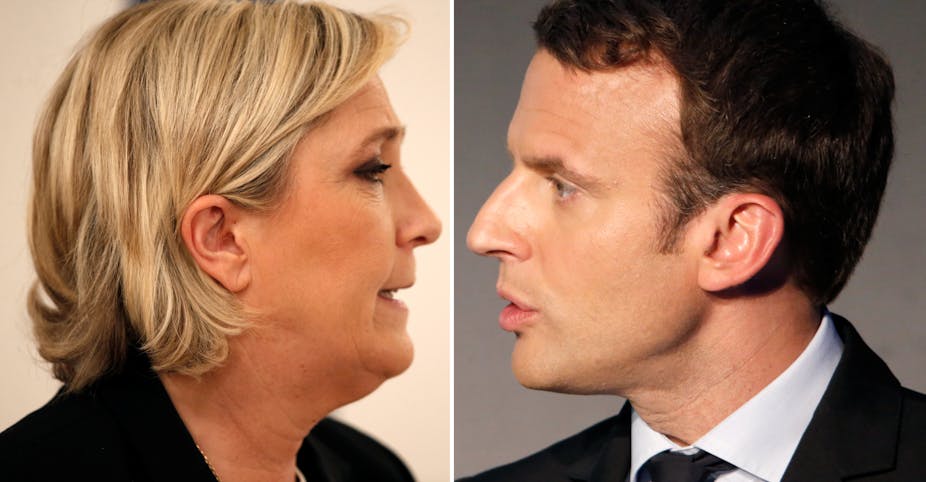The results of one of the most divisive and unpredictable presidential contests in recent French history, which saw early frontrunner, the conservative François Fillon, laid low by a corruption scandal and judicial investigation; a late surge by Jean-Luc Mélenchon the far-left firebrand who wants to take France out of the European Union and NATO; and the Socialist Party candidate Benoît Hamon come in a distant fifth place, are now in.
Centrist Emmanuel Macron and far-right Marine Le Pen will face off on May 7 in the second round of voting to determine who will be the next French president.
This is the first time since the Fifth Republic was established in 1958 that the top two from the first voting round do not belong to one of France’s two mainstream parties. Le Pen leads the far-right National Front, which has historically been on the fringe of French electoral politics, while Macron is running as an independent.
Two different visions for Europe
The outcome of the run-off could have historic and far-reaching implications for France, Europe, and the EU.
A Le Pen victory would mark the first time the extreme right has held power in France since the 1940s.
Macron, who quickly advanced through the Socialist Party hierarchy before leaving it to start his own political movement last year, has never held elective office.
The candidates offer two totally different visions for France’s future and its relationship to Europe. Le Pen has called the EU a “chimera” and a “anti-democratic oligarchy” and has promised a referendum on France’s EU membership within six months of taking office.
After last year’s Brexit vote, a Le Pen victory would signal that European voters are rebelling against the EU in a historic way.
Macron, on the other hand, embraces European integration and wants to deepen France’s partnership with Germany to lead Europe. His victory could lead to a rejuvenation of the EU at a time when the bloc faces a period of unprecedented and historic crises.

Beyond Europe, a Le Pen victory could threaten the post-second world war transatlantic alliance. Le Pen is a fierce critic of NATO and the US role in Europe. She would likely seek to align France more closely with Russia, precisely at a time when relations between Moscow and the West have deteriorated to their lowest point since the end of the Cold War.
She has called the sanctions imposed on Russia after its invasion and annexation of Crimea in 2014 “completely stupid,” and has suggested that she might recognise Russia’s seizure of the peninsula.
The most immediate impact of a Le Pen victory would likely be felt in the financial markets. Stock markets around the world would react strongly.
Anticipating a possible French exit from the Eurozone, investors would sell off the country’s debt. Fears of capital controls and devaluation could lead to bank runs in France.
Markets could even start to anticipate the collapse of the entire Eurozone, leading to serious economic, social, and even political disruption and destabilisation.
A Le Pen victory is still possible
Current polls show Macron easily beating Le Pen in the second round of voting.
While many experts continue to dismiss the possibility of a Le Pen victory in next month’s runoff, few would go so far as to say that it is completely unimaginable.
The central question is whether a “Republican front” will emerge to block Le Pen, as happened in 2002 when her father, Jean-Marie Le Pen, faced Jacques Chirac in the second round of presidential voting.
Left-leaning voters helped deliver a decisive victory for Chirac.
But if first-round supporters of François Fillon, Jean-Luc Mélenchon, socialist Benoît Hamon, or the lesser candidates do not come out for Macron – many of them see him as just a continuation of the dreadful Hollande government – Le Pen could have a chance. Her supporters tend to be more motivated and more likely to come out in strong numbers to vote.

A Le Pen victory would thus be a tragedy for those who believe in the idea and reality of a united Europe. Its economic and political integration was a French initiative, spearheaded after the second world war by visionary French statesmen, such as Robert Schuman and Jean Monnet.
Three generations of French and other European leaders devoted their careers to building a united and peaceful Europe. And until recently, most French leaders saw their country’s future as inextricably tied to the EU.
Ambivalence toward European integration
But when given an opportunity to express their voice, French voters have been ambivalent towards greater European integration. In a 2005 referendum, 55% of them said no to the adoption of a so-called EU constitution.
In 1992, French voters approved the Maastricht Treaty, which transferred more powers to EU institutions in Brussels, by the narrowest of margins, 51% for and 49% against.
And today, after some 20 years of economic stagnation, France has less influence in the EU than it has had in decades.
The EU has always been led by a Franco-German tandem, but the power balance today has shifted decisively toward Berlin. On issues ranging from Greek bailouts, the refugee crisis, or containing Russian aggression, Germany increasingly calls the shots.
Still, the majority of French voters want to remain in the Eurozone and the EU. According to a recent poll, 72% want to keep the euro.
And while a Pew Research Center poll last year found that 60% of French respondents hold an unfavourable view of the EU, more French citizens want to stay in the EU than to leave it.
Next month’s run-off then is a critical juncture for the future of France and the EU. Facing the effects of an unprecedented migration crisis, the rise of right-wing populism, Brexit negotiations, and nearly a decade of economic austerity, the EU is already embattled.
A Le Pen victory could signal the end of the project. The stakes could scarcely be higher.

